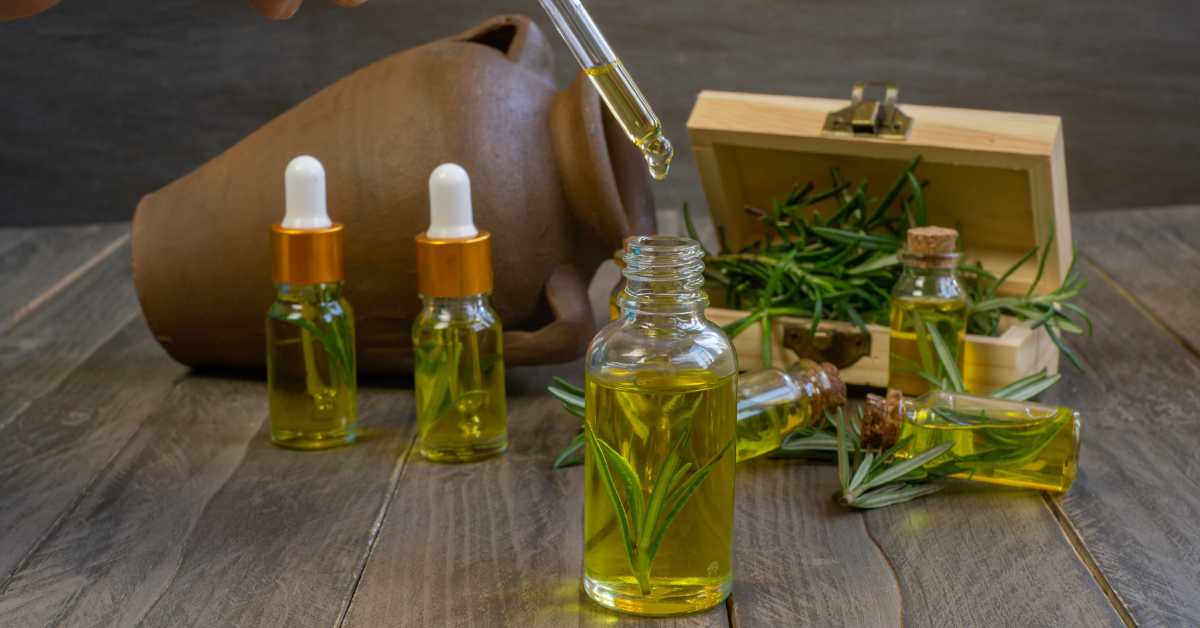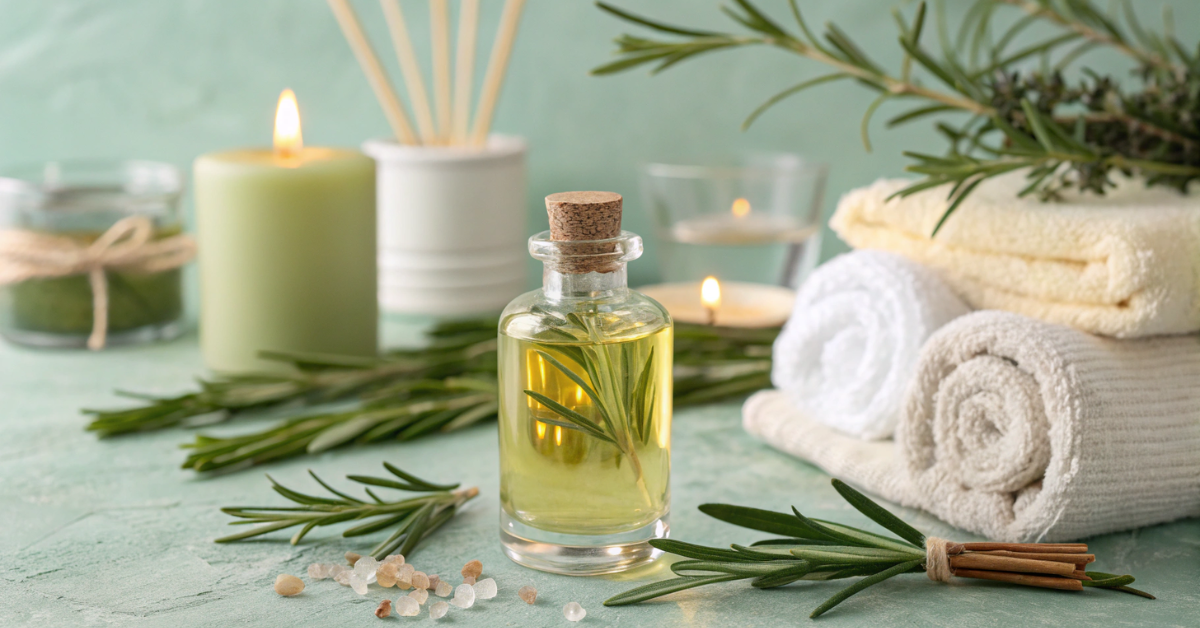Rosemary aromatherapy oil has long been cherished for its calming and focusing effects. Studies show that rosemary oil and lavender inhalation significantly reduced salivary cortisol and increased antioxidative activity in healthy volunteers. Its mood-enhancing aroma contributes to relaxation, mental clarity, and overall wellness.
The soothing, science-backed benefits of rosemary oil continue to combine age-old traditions with modern discoveries. In this article, we will explore the benefits of rosemary aromatherapy oil and its uses. Keep reading to learn more.
The Basics of Rosemary Essential Oil
Rosemary essential oil is typically extracted through steam distillation, a process where steam is passed through fresh rosemary leaves to vaporise the volatile compounds. These vapours are then condensed and collected, separating the essential oil from the water. The resulting oil is clear to pale yellow and has a strong, herbaceous aroma. You can use it for aromatherapy, massage, and skincare.
Active Compounds Found in Rosemary Essential Oil

Rosemary essential oil offers powerful benefits, thanks to several active compounds. Such as:
1,8-Cineole (Eucalyptol)
When you inhale rosemary oil, 1,8-cineole may help you feel more alert and focused. You might notice reduced stress levels and improved mental clarity. It can also support your breathing and respiratory health, enhancing your relaxation routine.
Camphor
You can benefit from camphor’s soothing properties, which may relieve muscle tension and help you relax after a long day. It also has anti-inflammatory effects that can support your overall comfort.
α-Pinene
α-Pinene can help you stay alert and focused while also supporting your cognitive function. You may also experience anti-inflammatory benefits, which can contribute to your overall sense of well-being.
β-Pinene
You can enjoy antioxidant and anti-inflammatory effects from β-Pinene. It may help reduce oxidative stress and support your immune system, making you feel healthier and more energised.
Rosmarinic Acid
Rosmarinic acid in rosemary essential oil may help you manage stress and inflammation naturally. Using rosemary aromatherapy, you might feel calmer, more relaxed, and better protected against oxidative stress.
Carnosic Acid
Carnosic acid may help you improve cognitive function and mitochondrial health. Clinical studies suggest it could also support weight management and gluten intolerance applications. Incorporating rosemary oil might enhance your overall wellness.
Health Benefits of Rosemary Essential Oil

Here are some of the health benefits of rosemary oil aromatherapy that you should know about.
Enhances Cognitive Function
Inhaling rosemary essential oil may help improve memory and cognitive performance. A study found that rosemary essential oil improved short-term memory in relation to images and numbers. This suggests that rosemary oil could be beneficial for mental clarity and focus.
Stimulates Hair Growth
Rosemary oil has been shown to stimulate hair growth in people with androgenetic alopecia. Research shows that both rosemary oil and minoxidil 2% significantly increased hair count after 6 months of use, with no significant difference between the two treatments.
Alleviates Stress and Anxiety
Rosemary oil aromatherapy may help reduce stress and anxiety. A study found that inhalation of rosemary oil decreased cortisol levels, a marker of stress, in participants. This suggests that rosemary oil could be a natural option for stress relief.
Improves Mood and Sleep Quality
Using Rosemary oil for aromatherapy may enhance mood and sleep quality. A study indicated that exposure to rosemary aroma improved sleep quality and reduced symptoms of depression in participants. This suggests that rosemary oil could be beneficial for emotional well-being.
Relieves Pain and Inflammation
Topical application of rosemary essential oil may help alleviate pain and inflammation. A study found that rosemary oil exhibited anti-inflammatory effects, which could be useful for conditions like arthritis. This suggests that rosemary oil could be a natural remedy for pain relief.
How to Use Rosemary Essential Oil for Aromatherapy

With a variety of uses in aromatherapy, rosemary essential oil is a versatile and powerful oil. Here’s how to use Rosemary essential oil for aromatherapy.
Diffusion
Using a diffuser is an effective way to disperse rosemary essential oil into the air. This method can help purify the air, uplift your mood, and enhance cognitive function. Simply add a few drops of the oil to your diffuser and enjoy the benefits throughout your space.
Direct Inhalation
For a quick mental boost, place a drop of rosemary essential oil on a tissue or cotton ball and inhale deeply. This method can help alleviate stress, improve concentration, and invigorate your senses.
Topical Application
Dilute rosemary essential oil with a carrier oil, such as coconut or jojoba oil, and apply it to your skin. This method can help soothe sore muscles, reduce inflammation, and promote relaxation. Always perform a patch test before full application to ensure skin compatibility.
Steam Inhalation
Add a few drops of rosemary essential oil to a bowl of hot water. Place a towel over your head and the bowl to trap steam, then inhale deeply. This method can assist in clearing nasal passages and improving respiratory function.
Bath Soak
Add a few drops of rosemary essential oil to your bathwater for a relaxing soak. This method can help relieve stress, ease muscle tension, and promote overall well-being. Ensure the oil is well-diluted to prevent skin irritation.
Safety Precautions and Side Effects
Rosemary essential oil is generally safe when used correctly, but you should always dilute it with a carrier oil before topical use. Avoid using it near sensitive areas such as eyes or mucous membranes.
Pregnant or breastfeeding individuals should consult a healthcare professional before use. Some people may experience skin irritation or allergic reactions. Always perform a patch test before full application.
Excessive inhalation can cause headaches or nausea in sensitive individuals. Keep the oil out of reach of children and pets to ensure safe usage at home.
Best Oils to Combine with Rosemary Essential Oil
When using rosemary oil, combining it with the right carrier oils enhances safety and benefits. Coconut, jojoba, and argan oils are ideal for skin and hair applications. Combining rosemary oil with lavender oil for aromatherapy can enhance relaxation, mental clarity, and mood. These combinations allow you to safely enjoy both topical and aromatic benefits, maximising rosemary oil’s therapeutic potential.
How Often Should You Use Rosemary Essential Oil?
For hair growth, applying rosemary oil 2–3 times per week is recommended. Studies suggest that consistent use over several months can yield visible results. Daily use Rosemary oil for aromatherapy is generally safe. However, it’s important to monitor your body’s response and adjust frequency as needed.
Always dilute rosemary oil with a carrier oil to prevent skin irritation. If you experience any adverse reactions, reduce usage frequency or discontinue use. Consult a healthcare professional if necessary.
What Not to Mix with Rosemary Essential Oil
When using rosemary essential oil, you should avoid mixing it with highly potent oils like thyme or cinnamon, as they may irritate your skin. You should also avoid using it in high concentrations, which can cause sensitivity or allergic reactions.
Always perform a patch test before trying any new blend to ensure it’s safe for you. If you’re unsure about a combination, consult a healthcare professional to protect your skin and well-being.
Read More: Bergamot Essential Oil: Benefits, Uses & Side Effects
Conclusion
With rosemary essential oil, you can improve focus, reduce stress, and have healthier hair and skin. You can apply it through aromatherapy, topical use, or baths while following safety precautions. It is important to understand its active compounds and how to combine them to maximise its effects. With careful and consistent use, rosemary oil becomes a natural, effective way to support your overall wellness and daily self-care routine.

